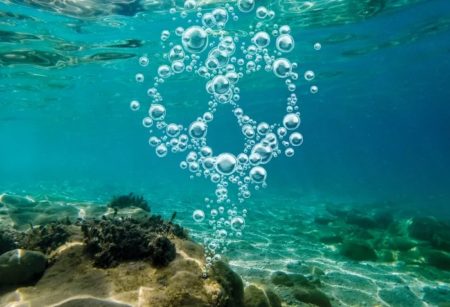January 9, 2020 – It used to be that overfishing was causing ocean species populations to plummet. And although our plundering of fish stocks continues, we have compensated by creating fish farms and aquaculture. You would think that through this innovation we would have saved wild species. But not we humans. Our polluting of the atmosphere, the consequences of our carbon addiction, is introducing ocean dead zones, places deprived of the normal levels of oxygen.
This condition is called hypoxia and it’s a growing threat to the world’s oceans. A study that appeared in the December 11th edition of Biology Letters describes how cod are disappearing from the Baltic Sea, not because of too many being taken, but because the conditions of the seawater are being altered. Climate change and carbon are integrally linked. Increased carbon dioxide (CO2) is altering ocean chemistry. And a warming atmosphere is warming surface seawater. The result is some telltale signs in fish stocks.
What fish are telling us
The research published in Biology Letters focuses on the composition of otoliths in Baltic Cod.
Otoliths are the bones and structures contained in the inner ear. In humans who have a pair of otoliths, they are responsible for hearing and balance. In fish there are three otoliths located behind the brain. They too are used for hearing and balance.
Like in humans, fish have small ear stones or crystals found in the hollows of the inner ear structure. The crystals are made of calcium carbonate and traces of other minerals including magnesium and manganese. The fish get magnesium and manganese from ocean water as they swim through it.
In healthy fish populations, magnesium levels in otoliths are high while manganese levels are low. But when a fish travels through deoxygenated areas of the ocean it absorbs more manganese from the seawater than normal.
So the accumulation of these two minerals with similar names tell us different stories. High levels of magnesium equate with healthy fish, but high levels of manganese mean the opposite, unhealthy fish.
So what causes hypoxia in ocean water?
Hypoxia refers to low levels of dissolved oxygen concentrations in the ocean, less than two to three milligrams per liter. Hypoxia is associated with excess nitrogen and phosphorus from fertilizer and farm runoff in rivers and lakes. In the ocean, it can be caused by changes in temperature gradients and salinity. Algae blooms and subsequent die-offs are associated with hypoxic sea and lake water. Warmer surface waters tend to encourage algae and bacterial population explosions followed by death. When a massive algae bloom dies it sinks into the ocean depths where it interacts with anaerobic bacteria and further contributes to hypoxia, but this time, at the bottom of the water column, not on or near the surface.
Are hypoxic zones in the ocean expanding?
According to recent research published in December 2019 in the journal Global Biogeochemical Cycles, there is considerably more evidence of widespread hypoxia throughout the world’s oceans and it is on the increase.
The authors of the study note that measuring hypoxia throughout the entire water column needs to be reconsidered in talking about climate change impacts on the world’s oceans. They note ocean dead zones may be expanding at faster rates than previously thought because the calculation of hypoxic areas at the bottom of the water column have not been fully incorporated into climate models. In their conclusions they state that the existing missing data means we are underestimating the full impact of oxygen depletion in the oceans in a warming world.
In the words of Dr. Sabine Lengger, the University of Plymouth, one of the authors of the study, she states, “Our findings explain some of the mismatches in carbon budgets when experimental and modeling estimates are compared — and it should, therefore, be included in biogeochemical models predicting feedbacks to a warming world. It is imperative to refine predictions in biogeochemical models as if dead zones will intensify more than expected (something which has already been observed), this will have severe ecological, economic and climatic consequences.”









